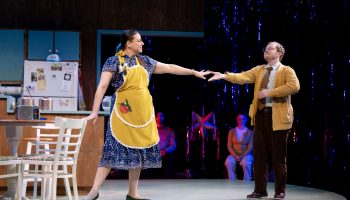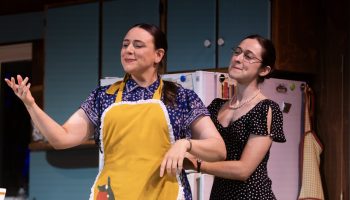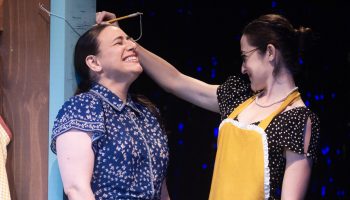
As they churn out production after production each and every summer without fail, it’s hard to imagine a time when Chautauqua Theater Company wasn’t stationed on the grounds to provide theatrical entertainment for Chautauqua audiences.
But the story of the time before CTC, and how theater arrived at the Institution in the first place, is exactly the one Jon Schmitz, Chautauqua archivist and historian, and Eleanor Blackman aim to tell in their lecture, “Fifty Years with the Chautauqua Repertory Theatre: The Cleveland Play House Comes to Chautauqua.”
Schmitz and Blackman will deliver their lecture at 3:30 p.m. today, August 2, in the Hall of Philosophy, as part of the Oliver Archives Heritage Lecture Series.
Blackman is the archivist for special collections at the Calvin Smith Library at Case Western Reserve University, and studies documents that might help shed light on Cleveland’s history and connections to other parts of the United States.
Chautauqua’s connection with Cleveland, Blackman said, is a strong one.
In 1929, Chautauqua lacked a resident theater company. But a visit from the head of the Cleveland Play House, Frederic McConnell, changed that.
“It was a very short courtship,” Blackman said. “The head of the Play House, Frederic McConnell, was at Chautauqua during the 1929 season, and we don’t know exactly what he was doing there, but he wrote to Arthur Bestor shortly afterwards saying, ‘Would you be interested in having a resident theater company?’ ”
McConnell didn’t have to wait long for a reply.
“(Bestor) replied rather quickly saying, ‘Why, yes we would. And we were sort of hoping it would be someone like you,’ ” Blackman said.
The rest is history, according to Blackman. From that point until 1980, the Cleveland Play House became the resident theater company for Chautauqua Institution during its seasons.

During their talk, Blackman and Schmitz hope to highlight the connection between the Cleveland Play House and the Institution, as well as the history of theater at Chautauqua more generally. Schmitz will focus on how theater came to be an accepted form of education and entertainment at Chautauqua, while Blackman will discuss how the Play House and the Institution are intertwined.
“It’s the story of two high-functioning cultural institutions uniting to make the very best product they could,” Blackman said. “It’s really an amazing story.”
After settling at Chautauqua, the Cleveland Play House began a long and prosperous stint at the Institution. Blackman said that while things weren’t always easy and many changes occurred over the years, the strong bonds between the two organizations kept the partnership going strong.
“I think the records show that both organizations continued to strive to establish a standard of excellence through their theater,” Blackman said. “We also know that time doesn’t stand still, and what was excellent in 1930 was different from what was excellent in 1970, so hearing the voices of the past as they change and evolve is interesting.”
According to Blackman, through working with Schmitz and the Chautauqua Institution Archives, a stronger, clearer picture of theater’s history at the Institution has emerged. And by using this stronger historical understanding, Blackman said she hopes the dramatic arts at the Institution continue to improve.
“I think it’s very important that theater archives can teach today’s students and dramaturges and theater professionals,” Blackman said. “Maybe there was a better way back then that was just lost through time. We don’t know, but we can find out.”
Blackman hopes that anyone with an interest in either theater or Chautauqua’s history will be inspired to explore the topics further after attending the lecture. She hopes to make people aware that both the Case Western and Chautauqua archives are open and ready to serve a curious public.
“If any topics I touch on spark (Chautauquans’) interest, I hope that they’ll reach out to us and try to explore further,” Blackman said. “I know that Chautauqua is an educational institution, and we’re here to help further that education.”
Amidst the large selection of programs offered at Chautauqua, Blackman acknowledged that there’s a lot to take in. There isn’t always time to dig deeply into the history of each and every speaker, performer or production. Despite that, Blackman said when the opportunity presents itself, digging deeper is always worthwhile.




